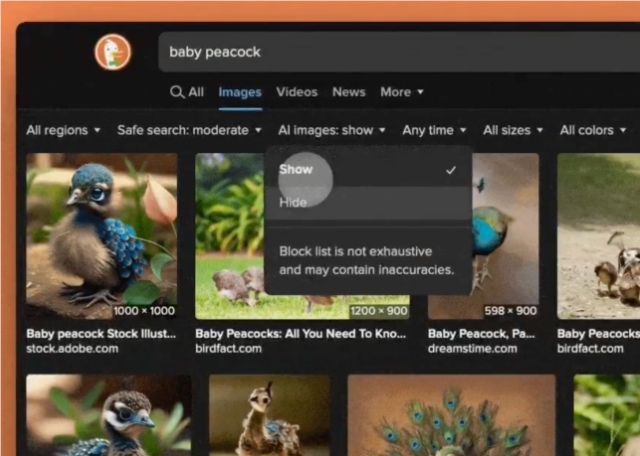Recently, the privacy-focused search engine DuckDuckGo announced a new feature that allows users to easily filter out AI-generated images from their search results. With the rapid increase of AI-generated content on the internet, many users have reported that AI images often interfere with their experience of finding real information. To address this issue, DuckDuckGo decided to respond to user demands.
When performing an image search, users can simply go to the "Images" tab on DuckDuckGo, click on the newly appeared "AI Images" dropdown menu, and choose to "Show" or "Hide" AI-generated content. Additionally, users can enable this filtering feature through the "Hide AI-Generated Images" option in the search settings, making it simple and intuitive to use.

DuckDuckGo stated that this filtering feature is based on a manually maintained open-source blacklist, including resources such as uBlockOrigin and uBlacklist Huge AI Blocklist. Although this feature cannot guarantee 100% blocking of all AI-generated results, it can significantly reduce the number of related images users see, making the search experience cleaner.
The launch of this new feature coincides with the widespread phenomenon of "AI garbage" on social media, which refers to low-quality content created using generative AI technology. DuckDuckGo has promised to add more filtering options in the future, although specific plans have not been disclosed yet.
Interestingly, DuckDuckGo demonstrated the user search for "baby peacock" images in its example, which may be a reference to a controversy from last year: at that time, Google displayed mostly AI-generated peacock images instead of real photos when searching the same keyword. This phenomenon caused user dissatisfaction and prompted DuckDuckGo to take action.
DuckDuckGo's new feature not only improves the user search experience but also provides a practical solution for users who want to reduce AI content interference. In the future, with the introduction of more filtering options, users will be able to enjoy a more personalized search service.
